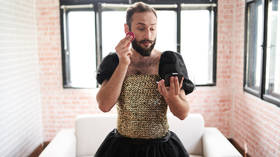How freedom of choice on gender divides children and their parents
As schools increasingly push freedom of self-identification, parents are often unaware of how deeply rooted this ideology has become among their children. A number of international experts tell RT there’s reason to be concerned.
You can never know for sure what’s going on in another person’s head – especially when that person’s a child. And, while you might imagine otherwise, particularly when it’s your own child. Are you so certain you really know everything about them? The reality may shock you.
The scenario in which children trust their ‘virtual’ friends more than their parents is nothing new. The rift between generations is deepening. And, in many places, one of the key factors contributing to this division is the education system. Schools are so focused on honouring students’ freedom of expression and self-identification – including when it comes to their gender – that they often make children’s lives more complicated and stressful rather than less.
“Projects to be worked on”
Angus Fox, a British academic who represents a global alliance of parents and professional groups in his role as the MD of Genspect, is of the view that, in countries where the debate over gender issues being on the school curriculum is raging, the education system has become too political. He says, “Teaching children the basic skills they need to value themselves, to look after their own mental health first and foremost – that seems to have gone. Practical things seem to have disappeared from the curriculum, to be replaced by very ideological stuff.”
Some teachers even appear to view their pupils as a sort of scientific experiment, Fox suggests. “They see children as projects to be worked on, so they start to have this very emotionally intrusive relationship,” he explains. Younger teachers, in particular, may reject the normative beliefs of the older generation – and that applies not only to more senior colleagues, but to some children’s parents too. “They see these very vulnerable children asking, ‘What am I?’ and they take advantage of that – almost, in a way, attacking their parents. What’s happening in schools is terrifying.”
It’s not about child welfare – it’s about teachers creating the kind of the world they want to live in.
The situation is very concerning, according to British science teacher and writer Debbie Hayton, who is herself transgender. What happens in schools is going far beyond the concept of ‘safeguarding,’ she says. “Safeguarding is where we protect children from possible harm. As teachers, we tell children that we can’t keep secrets. If children tell us something important, we need to share it with other responsible adults. But there’s a different standard being applied to these transgender-identified children, which is that secrets can be kept from their parents.”
Whatever the situation, the same rules should be applied, Hayton insists. Last year, she spoke to a mother from Massachusetts whose 14-year-old daughter had identified as transgender for three years. Jennifer, a physician in her 50s, told Hayton her child’s school hadn’t revealed that she had started to question her gender identity. When the teenager asked to be prescribed puberty blockers, Jennifer realized no one had warned her daughter about the possibly irreversible side effects.
Also on rt.com ‘My 12yo daughter’s friends and teachers pushed her into wanting to be a boy... thank God lockdown allowed her to escape’Fox is aware of stories like Jennifer’s. He says, “I heard of a young girl who started to take testosterone, and her mother said, ‘It can damage your bone health, as you’re a girl.’ But she replied, ‘I identify as a man, so why would testosterone affect me differently from anyone else who’s a man?’ These kids truly believe they can say they’re something and they become something. When the enormity of that hits the parent, it’s often too late.”
There’s a whole generation of kids who find it very difficult to believe you if you say, ‘Hold on! It’s not that simple. You’ve got this body and you can’t mess it up!’
“I have a friend who’s a male de-transitioner, and he says that the people he was hanging around with treated their body like it was a customizable object, like a doll,” continues Fox. Young people are often very naïve, no matter how smart they are, and the danger is that their decisions can be influenced by campaign groups, some of which receive funding from pharmaceutical companies, he cautions.
“Influencing children towards a specific way of thinking”
Mary Laval, a member of Genspect’s press team, is the mother of a gender-questioning teenager. She thinks schools should be inclusive and encourage children to be open-minded. “However, it’s not their place to start teaching kids ideology and to spread misinformation,” she says. In her view, gender ideology has become akin to religion, and, and, as in non-religious schools, parents have the right to expect that their children are not taught religion. It’s a plea made by many parents: to have the right to choose whether their son or daughter is taught that they have the freedom to choose their gender.
Reports of schools trying to hide their students’ gender preferences from their parents – usually justified by the institution’s need to protect vulnerable minors – are frequently reported in the media. Occasionally, parents file lawsuits, being of the view that they have the right to know what’s going on with their children.
Sometimes, the pursuit of ideological goals leads to major problems, as evidenced by the recent scandal involving the Loudoun County School Board, in Virginia, US, which became far greater than just a local conflict between parents and the education system. Two sexual assault cases were filed in two different schools in the space of six months, with the same student convicted of one charge and facing a sexual battery charge for the other. Parents in the county were furious, blaming the authorities for seemingly having tried to silence the matter after the first case, which saw the male student in question enter the female toilets wearing a skirt and carry out the aforementioned assault. Students themselves staged a protest demanding their school guarantee their safety.
According to Genspect founder Stella O’Malley, a psychotherapist and best-selling author, it’s inappropriate for schools to misuse their position of responsibility to influence children into thinking a certain way. She says, “Schools are for educating young people, for broadening their minds. Young people need to be allowed the opportunity to first learn about concepts in a neutral manner so they can ultimately decide for themselves their own views on any given topic.”
There’s one more angle to this issue that’s worth considering here. Relationships between teenagers are not always straightforward – they’re often not very kind to each other. Last month, it was reported that a group of students from an Illinois high school staged a survey asking whether “queers” should be allowed to use the restroom alongside “normal people.” That’s just one example of the anti-LGBTQ+ sentiment coming to the fore in some American high schools, fanned, it would appear, by an insistent focus on gender and sexuality. Many professionals believe the question of gender wouldn’t have become so difficult for youngsters of all persuasions if the debate – which was originally initiated by adults, after all – hadn’t been allowed to get so heated.
Fox says most parents don’t believe it’s a problem to teach about gender in school until it affects their family personally. He explains: “You get this phenomenon of ‘Well, yes, but not my child.’ A lot of parents I work with have been very honest and said, ‘Mea culpa. I made a terrible mistake. Because, before it was my child, I saw other children going through this and I thought, it was a good thing that we now have more trans people.’” However, when it comes to being told by their child’s school about their own offspring’s wish to transition, Fox says, their opinion often changes drastically. “They say, ‘It can’t be true. I don’t believe what you say.’”
Also on rt.com Disney hosting ‘Drag Queen Story Hour’: Yet another instance of corporate America pushing the sickening sexualization of childrenThe situation is exacerbated by mainstream and social media pouring fuel on the fire, while, at the same time, avoiding covering all sides of the argument. Fox says, “It’s as if you say you’re trans and everyone should jump up and celebrate, and anyone who does anything different is a figure of hate. It’s very difficult to operate in that climate.”
However, the tide may be turning. According to Hayton, the public is starting to challenge the one-sided narrative, at least in the UK. “The line being pushed is that children have their gender identity and only they know about it, and that needs to be affirmed at all cost. But people are speaking out against that, and there’s a debate now,” she says. “In other English-speaking countries, I’m seeing less of it, however – they seem to be further behind.”
Those who feel there should be a broader dialogue are coming under a lot of pressure, but they’re persevering, determined to ensure alternative views get airtime too. “There are a lot of people willing to start the debate,” she concludes.
If you like this story, share it with a friend!
The statements, views and opinions expressed in this column are solely those of the author and do not necessarily represent those of RT.















